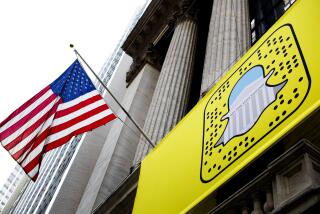Groupon CEO defends focus on daily deals, diversification
- Share via
In spring 2011, Groupon Inc. was said to be worth as much as $25 billion — an amazing valuation for a company that still isn’t 4 years old.
Today, the daily deals pioneer is no longer the same tech darling. Groupon has kept growing, but an onslaught of criticism about its business model has come at a real price. The Chicago company that was worth $13 billion when it went public in November now has a market capitalization of $3 billion. Groupon’s stock is down nearly 80% year to date.
From Chief Executive Andrew Mason’s point of view, the company he built from scratch is flying high and is just starting to realize its vision of bringing local commerce online.
“We’re growing 45% year over year,” Mason said. “I think most companies would kill for those kinds of growth rates. We’re quite proud of them.”
Assessing Groupon’s growth prospects isn’t easy, especially because the daily deals business is such a new industry. Many analysts pointed to a slowdown in quarter-on-quarter revenue growth as a warning sign that Groupon’s core business of selling discounted restaurant meals and massages is losing favor with consumers. Defending himself against the critics, Mason said they are using the wrong criteria.
“We’re an e-commerce company that does over $5 billion in sales every year, and like every other e-commerce company that’s operating at this scale, you have to look at us at a year-over-year basis,” Mason said. “Amazon has something like two quarters a year of negative quarterly sequential growth. It’s simply the wrong way to evaluate an e-commerce company.”
The Amazon.com Inc. comparison is appropriate, Mason maintained, saying “Groupon has the opportunity to be the world’s first marketplace for local commerce in the same way that Amazon is the dominant marketplace for retail commerce.”
These ambitions have propelled the company into a number of new categories beyond connecting local stores and spas with consumers. Groupon now offers deals on travel and physical goods.
For Edward Woo, a senior research analyst at Ascendiant Capital Markets, the diversification could prove to be a necessary buttress against what he believes is a slowdown in Groupon’s main business.
“The sense that they’re growing overall is good … [but] they’re not going to get growth everywhere,” said Woo, who has a “sell” rating on Groupon’s stock.
“Unfortunately, I’m pretty negative on the daily deal space,” he said. “I think it’s saturated; there’s a lot of fatigue. I think it’s good that Groupon is branching out.”
Mason said the expansion into new categories such as Groupon Goods is part of the company’s long-term plan to invest in areas that will “increase wallet share of our customers.” But he believes the core daily deals business still holds appeal for consumers.
“Local commerce is something like a $3-trillion global industry,” Mason said. “We feel like we’re in the early innings of realizing the opportunity of taking offline commerce and plugging it into the Web. It’s still very much about discovery.”
To manage Groupon’s rapid transformation from local daily deals provider to e-commerce giant, Mason has brought in senior executives from other Internet companies such as Amazon and EBay Inc. He downplayed concerns of turnover, particularly in the company’s sales staff, saying Groupon’s retention rates are higher than those of its peers.
“We’re very focused on the future and unlocking the potential of the business that we have in front of us,” he said. “It’s easy to look back in retrospect and say that you could have done things differently, but there are risks in making decisions. We are focused on the future.”
More to Read
Inside the business of entertainment
The Wide Shot brings you news, analysis and insights on everything from streaming wars to production — and what it all means for the future.
You may occasionally receive promotional content from the Los Angeles Times.










